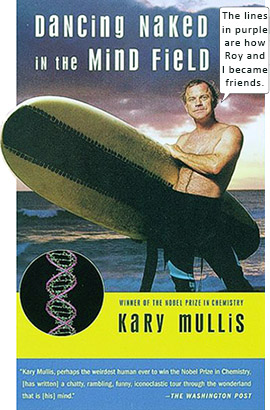The Final Four Paragraphs
of Kary Mullis Nobel Prize
Acceptance Speech
For three months I did sporadic experiments while my life at home and in the lab with Jennifer was crumbling. It was slow going. Finally, I retreated from the idea of starting with human DNA, I wasn’t even absolutely sure that the Genentech sequence from Nature that I was using was from a single exon. I settled on a target of more modest proportions, a short fragment from pBR322, a purified plasmid. The first successful experiment happened on December 16th. I remember the date. It was the birthday of Cynthia, my former wife from Kansas City, who had encouraged me to write fiction and bore us two fine sons. I had strayed from Cynthia eventually to spend two tumultuous years with Jennifer. When I was sad for any other reason, I would also grieve for Cynthia. There is a general place in your brain, I think, reserved for “melancholy of relationships past.” It grows and prospers as life progresses, forcing you finally, against your grain, to listen to country music.
And now as December threatened Christmas, Jennifer, that crazy, wonderful woman chemist, had dramatically left our house, the lab, headed to New York and her mother, for reasons that seemed to have everything to do with me but which I couldn’t fathom. I was beginning to learn tragedy. It differs a great deal from pathos, which you can learn from books. Tragedy is personal. It would add strength to my character and depth someday to my writing. Just right then, I would have preferred a warm friend to cook with. Hold the tragedy lessons. December is a rotten month to be studying your love life from a distance.
I celebrated my victory with Fred Faloona, a young mathematician and a wizard of many talents whom I had hired as a technician. Fred had helped me that afternoon set up this first successful PCR reaction, and I stopped by his house on the way home. As he had learned all the biochemistry he knew directly from me he wasn’t certain whether or not to believe me when I informed him that we had just changed the rules in molecular biology. “Okay, Doc, if you say so.” He knew I was more concerned with my life than with those cute little purple-topped tubes.
In Berkeley it drizzles in the winter. Avocados ripen at odd times and the tree in Fred’s front yard was wet and sagging from a load of fruit. I was sagging as I walked out to my little silver Honda Civic, which never failed to start. Neither Fred, empty Becks bottles, nor the sweet smell of the dawn of the age of PCR could replace Jenny. I was lonesome.
# # END # #
